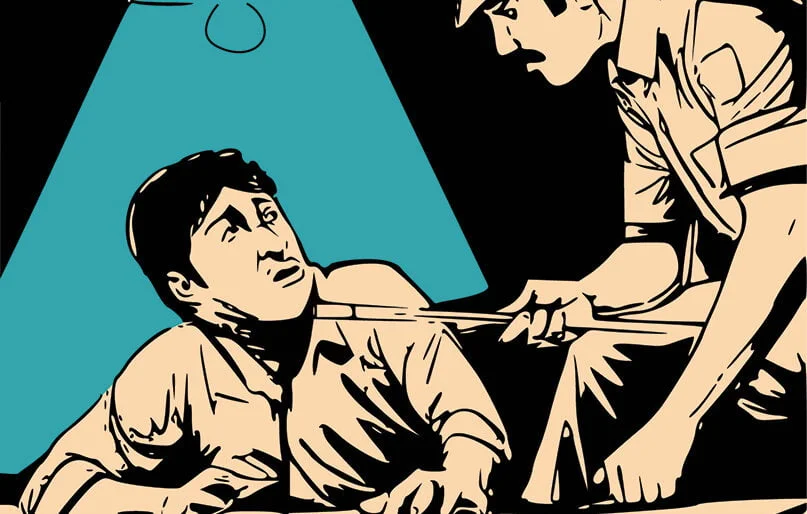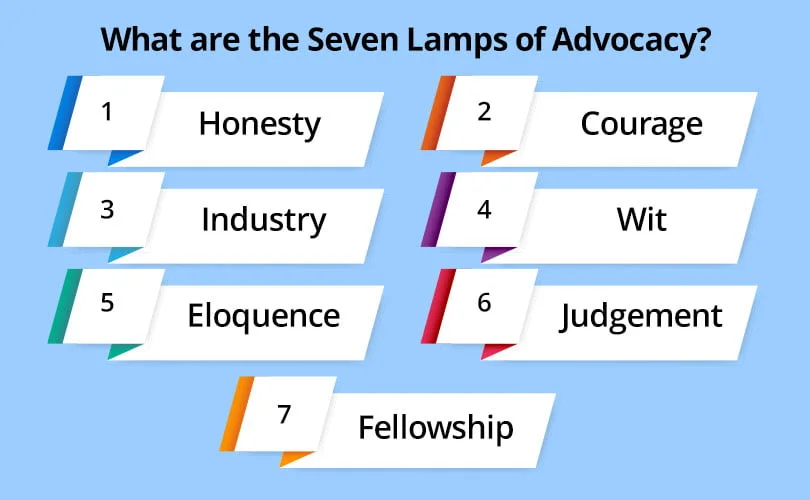
There was a metaphorical framework which was created to help and inspire the lawyers and advocates, in their pursuit of justice which is known as ‘Seven Lamps of Advocacy’.
These are basically principles or values which a lawyer or advocate must possess so that their practice is effective and successful. These lamps are based on a book by the same name which was authored by the Honorable Justice Abbott Parry. These lamps were laid down by the Justice so that the man who is an advocate, works harder and efficiently, in order to get the justice for the ones who need it.
Justice Parry adopted this approach to properly identify the seven essential qualities which would lead to an effective advocacy. These lamps are outlining the ethical duties of an advocate, which includes the obligation to be truthful, to avoid misleading the court, and to represent the client in the court with the right interest and attention.
Legal profession is the profession which avowed with ethics. The base of the profession mainly is professional ethics. The legal person involved i.e. the advocate or lawyer should possess to keep up with the legal duties which includes the law and justice by properly balancing the relationship between the bar and the bench.
There are rules which the advocate needs to follow which has been incorporated in the Section 49(1) (c) of the Advocates Act, 1961. This provision makes sure that the bar council is empowered to regulate the rules on the standard of professional standard which is to be observed by the advocates.

There are certain qualities that need to be followed by the advocates for them to maintain the law and justice in the society. These qualities basically deal with the integrity, wittiness, proficiency, articulacy, rationality which need to be seriously mastered by the legal person who is part of the court. There are Seven Lamps of Advocacy that needs to be followed for an advocate to work efficiently and smoothly.
When it comes to law, it is very necessary for the lawyer to be honest lawfully. Due to their fiduciary duty, the lawyers have to uphold honesty towards their clients and act according to their clients’ best interests. There are aspects of the lawyer’s work which generally includes their arguments, thoughts and words, in which their honesty should get reflected.
Being straightforward and honest can be portrayed as not being dishonest, trying to cheat, relying on a leverage of deceit or having any other criminal behaviour. This will only lead to a professional misconduct and be a violation of the law.
An Advocate or Lawyer is supposed to produce all types of oral and documentary evidence which has to be presented in the Court of Law. The Advocate has to present the correct evidence, honestly, so that an innocent person doesn’t get punished in the process. The Advocates to imply honesty in certain places.
1. Being honest with the client by telling them about the case and what is the status of it. Advocate has to tell their client about the pros and cons of the case.
2. Being honest with the opposition by not giving out any false facts about them which would divert from the actual matter which is the case.
3. And finally, being honest towards law is by giving out the truthful fact in front of the judge, which is by not giving any false statements.
One of the important factors of the Seven Lamps of Advocacy is Courage. This means the advocate must be fearless when they are standing in front of the court. They have to have the courage and the confidence while they are arguing in a certain case.
Being courageous, makes it easier for the Advocate to convince the judge that all the facts which have been presented need to be honest and true, when representing their client. Numerous problems are faced by the lawyers if they have a civil or criminal litigation in front of them. But yet, the lawyers shouldn’t be scared in such situations.
The main weapon that an Advocate should understand is the courage which they apply in the court with having a deep knowledge of the law. The Advocate should be prepared mentally for any kind of case.
Being a Lawyer, it is very much important to have proper knowledge of the law. There can’t be any kind of ignorance when it comes to law. If a Lawyer is handling a case, they need to know the law for fighting the case in the right manner.
With an insufficient knowledge, the Lawyer might lose the case. So, it is better for them to properly study the case, by seeing what all laws can be applied in the case.
The Lawyer must also keep themselves updated with laws if there are any new laws which have been passed. The Lawyer will be facing a lot of problems if they are unaware about the new laws.
This lamp of advocacy is necessary for an advocate is supposed to have the whole skillful set to properly flourish in the world of law.
This lamp means to have the ability to talk to the point on what the lawyer is thinking of expressing creatively. The quality of Wit is needed for an Advocate to have because it gives them better analyzing abilities. Having a script on what to say and what not, is a scenario which never works out. But if the lawyer is quick on their feet and can use their wittiness, it can help them in winning a case.
Having the proper wit and good sense of humour can help an advocate become calm and really active, mentally. Once the environment is lightened, the advocate is able to focus and operate in much more efficient way
Even though, a well-rehearsed speech might work but it isn’t always good enough. Answering the questions that judge the asks, in a witty manner can play a crucial part for the lawyer’s victory in the case.
Being eloquent is a person who has a way with words. Because with the proper use of words can be way more effective and memorable for the judge, the clients and the people who are present in the court.
Eloquence is an art which is used orally which showcases the fluency and skillfulness of the advocate as it is way of communication which minds and hearts of the judge and the people who are present there.
Eloquence can be seen when the advocate is speaking skillfully, is confident in front of the judge, without making any errors while speaking, whatever they say should be effective and by having a good presence of mind during the case.
The literal meaning of the Writ of Certiorari is ‘to be certified’ or ‘to be informed’. This Writ is issued by a court to lower court or tribunal ordering them either to transfer the case pending to them or quash their order in a case. The writ is issued on the grounds of an excess of jurisdiction or lack of jurisdiction or because of the error of law. It is not only preventing but rectify the mistakes in the judiciary.
Whatever happens inside the court, between both the parties, shouldn’t have an effect when they are outside the court. So that this situation doesn’t occur, the lawyers are obliged to join the bar association after they have received a Certificate of Enrollment under Section 22 of the Advocates Act, 1961.
But other than the Seven Lamps of Advocacy, there was eighth lamp which was coined by an Indian lawyer and former judge of the Madras High Court, V Krishnaswamy. That lamp is Tact.
Often when an argument takes place in the court, there are times when it goes out of limits and the situation becomes worse. But in such situations, the advocate must properly govern their client, have a control over the opposition in the case and be able to convince the judge. A powerful approach by the advocate is much necessary while doing so.
In Conclusion, the Seven Lamps of Advocacy emphasizes the importance of these qualities in order to become a successful lawyer or advocate. These lamps till date are inspiring lawyers all around the world. The true victory for an advocate is not based on how many cases they have won but is when they create an impact which becomes long-lasting on the lives of people they represent and the others who are present in the court.








Whether seeking proactive counsel for a business or navigating
complex personal legal rights, Lion Law LLP’s team is prepared to
provide the necessary support and solutions.

Lion Law LLP provides unprejudiced & professional legal advice to all individuals and businesses.

Globally Recognized Standard for Quality Management

International Standard for Security Management
Copyright © 2026. All rights reserved.